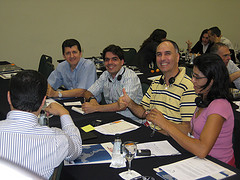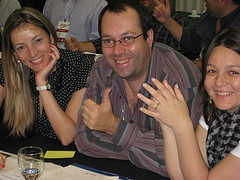In 2011-12, STVP will present an entirely new series of Accel Roundtable on Entrepreneurship Education (REE) conferences, in partnership with regional hosts on five continents. REE conferences bring together business, science, engineering and design faculty, with business and policy leaders, interested in building leading-edge entrepreneurship programs and ecosystems.
Someone who truly understands the power of these events is STVP Co-Director Tom Byers. As a dedicated entrepreneurship educator at Stanford’s School of Engineering, Byers is excited by the ever-growing wave of interest for entrepreneurship and innovation education around the world. Byers sat down with us to discuss the benefits of the REE conference experience and how each conference offers something unique for regional attendees.
__________________________________________________________________
New conference dates have been announced for the 2011-12 season. Where is REE headed this year?
Byers: Our schedule for the upcoming year is really fantastic. We are kicking things off in Puerto Rico, where Interamerican University will host REE Latin America in October. The 2010 REE Latin America conference was a packed house, so we’re excited to build on that success, this autumn, in San Juan. We also have upcoming REE conferences scheduled in Asia, Europe, the Middle East/North Africa region, and we will also hold REE USA in San Francisco, in partnership with the NCIIA’s OPEN conference in March.
See the entire REE conference schedule for 2011-12
How would you describe the REE conference experience?
 Byers: Focused and collaborative. The educators and leaders from business and government who attend REE know these are very special gatherings. You get the chance to meet and work side by side with leaders in the field. You are surrounded by colleagues who are passionately committed to driving innovation and entrepreneurship education. And attendees leave with an infectious desire to be change-makers once they return home. Plus, REE conferences are intimate enough to offer attendees solid face-to-face time to network and build relationships with peers.
Byers: Focused and collaborative. The educators and leaders from business and government who attend REE know these are very special gatherings. You get the chance to meet and work side by side with leaders in the field. You are surrounded by colleagues who are passionately committed to driving innovation and entrepreneurship education. And attendees leave with an infectious desire to be change-makers once they return home. Plus, REE conferences are intimate enough to offer attendees solid face-to-face time to network and build relationships with peers.
Is that intimate environment created by design?
Byers: It’s one we definitely encourage, and I think that each conference reflects this attitude to some extent. REE conferences are very interactive, with less emphasis on the presentation of scholarly papers than at traditional academic meetings. And each REE also has a unique character that reflects the host region’s culture and entrepreneurial ecosystem. We love to see new ideas presented at REE, and watch them be tested and examined through a region’s specific cultural lens.
View the REE Latin America 2011 program schedule and register now
Do you see similarities from region to region when it comes to entrepreneurship education?
[quote_right]Today’s educators want their research and coursework to have a sustaining power to affect change in the real world.[/quote_right]Byers: Absolutely. Every university would like to have deep impact within their local or national entrepreneurial ecosystem. At REE, we don’t see a lot of faculty or institutions solely interested in abstract or esoteric aspects of entrepreneurship. Today’s educators want their research and coursework to have a sustaining power to affect change in the real world.
What does change mean in this context?
Byers: It really depends, as entrepreneurial focus can vary from program to program. Some schools are looking to focus solely on training founders or being an incubator for their region. While this is not the purpose of our program at Stanford, we understand many international faculty are working within entrepreneurial ecosystems that are still early in their development, and with student populations with far less exposure and inherent inclination for the entrepreneurial life.
Can you describe a best-case example of experiential entrepreneurship learning?
Byers: At Stanford we try to infuse experiential learning into as many of our entrepreneurship and innovation courses as possible. This may be most evident in our Mayfield Fellows Program, which I have the sincere pleasure of teaching. Each spring a select group of our students take a deep dive into entrepreneurship through a series of classes and a hands-on internship in a developing technology company. This frontline exposure provides a lifetime of insights for the students.
Is it possible for faculty at other schools to build this type of program, particularly outside Silicon Valley?
[quote_right]I think it’s just as important, if not more so, for programs outside Silicon Valley to build course experiences that connect students to major technology firms in a region.[/quote_right]Byers: I think it’s just as important, if not more so, for programs outside Silicon Valley to build course experiences that connect students to major technology firms in a region. While we would encourage all students who have a desire to start their own companies, not everyone who takes entrepreneurship courses will end up founding a company or becoming a serial entrepreneur. However, entrepreneurship education provides broad skills that complement a technical education, which can then empower students to become innovative professionals in larger, established organizations, as well.
How should an entrepreneurially-minded faculty member go about developing a program?
 Byers: A major key is for educators to identify the business, science and technology leaders who are successful in their home region. These leaders run the companies that can provide support and mentoring opportunities to get a program off the ground. Of course, designing a regionally-informed curriculum that fits the needs of the ecosystem is also a critical component. That’s why we started the Roundtable on Entrepreneurship Education conference series in 1998. At REE, educators can connect with one another and share the latest strategies and most-effective techniques for teaching entrepreneurship. The insights and tools you learn at REE can be put to work immediately.
Byers: A major key is for educators to identify the business, science and technology leaders who are successful in their home region. These leaders run the companies that can provide support and mentoring opportunities to get a program off the ground. Of course, designing a regionally-informed curriculum that fits the needs of the ecosystem is also a critical component. That’s why we started the Roundtable on Entrepreneurship Education conference series in 1998. At REE, educators can connect with one another and share the latest strategies and most-effective techniques for teaching entrepreneurship. The insights and tools you learn at REE can be put to work immediately.
See the Accel Roundtable on Entrepreneurship Education series for 2011-12.


